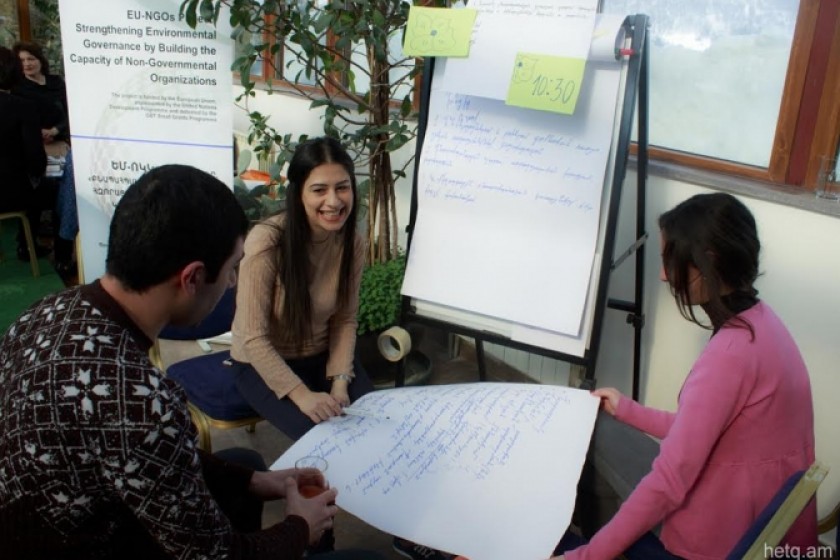
Armenia: ATP Scales Up Environmental Education with New Coalition of Partners
“There are mounting environmental challenges facing Armenia that affect the welfare of entire communities, and infringe on a student’s right to attain the highest standard of health. Therefore, environmental education is a pathway to future social and economic stability,” explains ATP Country Director LucinehKassarjian.
Moving beyond tree planting alone, Armenia Tree Project (ATP) has made environmental education one of its core programs since 2005. The idea has been put into practice through active collaboration with NGO’s, government ministries and international organizations to develop new education approaches to accommodate the needs of schoolchildren.
Last month, ATP organized and participated in three public events geared toward environmental education and the potential for its expansion in schools at the national level.
“Many organizations are operating in this field, but there was a lack of cooperation,” notes Environmental Education Program Manager AllaSahakyan. It was this realization that led to the strengthening of the Environmental Education Network (EEN) in 2014.ATP has led this two-year project aimed at strengthening the capacity of civil society organizations to implement environmental education programs.
The “Empowering Environmental Education Network for Strengthening Environmental Governance in Armenia” project was funded by the EU’s Strengthening Environmental Governance by Building the Capacity of NGO’s Project, implemented by the United Nations Development Programme (UNDP) and delivered by the GEF Small Grants Programme (SGP). EEN now involves more than 30 civil society, education and international organizations operating in Armenia.
The conference held on February 17as part of the abovementioned project was focused on making recommendations for improved environmental education policies and cooperation between stakeholders. The presentations and discussion were intended promote participatory decision-making and to inform the government on ways to incorporate environmental issues into policies and strategies such as the State Program of Education Development for 2016-2025.
“We strongly believe in the power of environmental education. It brings together concerned adults and the young generation,” noted UNICEF’s Armenia Representative Tanya Radocaj at the event. “It brings the energy of young people, of children, upfront.”
This energy has been the driving force for ATP’s education programs, beginning with the publication of the “Plant an Idea, Plant a Tree” teacher’s manual and the opening of two education centers sponsored by Michael and Virginia Ohanian of Boston. In 2015, for example, more than 3,500 students visited the Ohanian education centers in Karin and Margahovitvillages.
As a follow up to the global climate change negotiations that took place in Paris in December, ATP and its partners organized a round-table discussion on February 4 that focused on the role of education and raising awareness around climate change in Armenia. The Paris talks broke new ground when 195 nations reached an agreement on the need to address climate change and its impact. Several experts were on hand to discuss the negotiations and its relevance to Armenia as a developing country that is also feeling some of the effects of a changing climate, including long, dry summers and extreme weather events that can wreak havoc on roads, topsoil and crops.
Another participant in the discussion, Anahit Gasparyan, the senior specialist of the National Institute of Education,noted that when teachers have a low level of familiarity with an issue such as climate change, they are unable to pass it on in an effective way, so improved environmental training practicesare useful in bridging the gap of “scalability.”Diana Haroutyunyan, the UNDP Climate Change Program Coordinator, expressed confidence that in the global context, it is important to find out how people learn so as to adapt methodologies accordingly.
“We’re inspired by the level of interest and activity in the field of environmental education in Armenia. When we started in 2005 there were very few working in this area, and now through EEN we have developed working relationships with NGO’s and government who are committed to improving the quality and impact of this important field,” concludes Kassarjian.
Photo: A workshop organized with partners in the Environmental Education Network developed the Network’s future strategy: “An environmentally conscious generation for a green and sustainable planet”
 Videos
Videos Photos
Photos




Write a comment